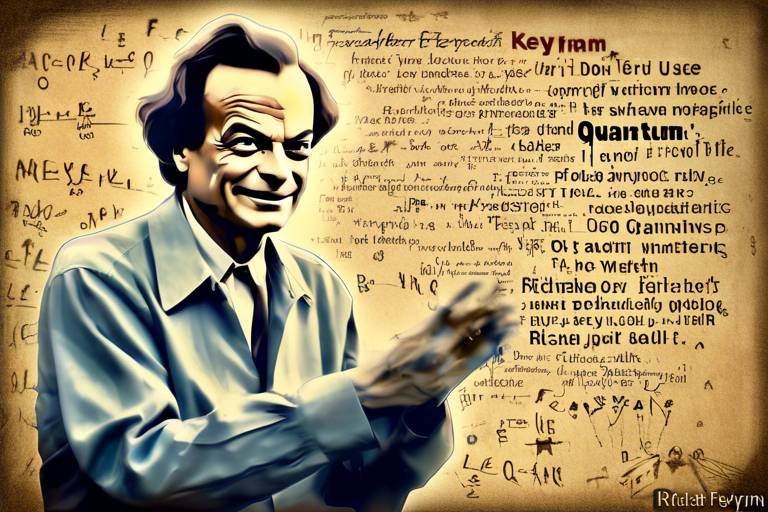Ada Lovelace: The First Computer Programmer
Ada Lovelace, often referred to as the first computer programmer, holds a significant place in the history of computing. Her pioneering work and visionary insights have left an indelible mark on the field of computer science, shaping the way we perceive technology and its capabilities.
Ada Lovelace was born in 1815 to the famous poet Lord Byron and Anne Isabella Milbanke. Despite her unconventional upbringing, Ada showed a keen interest in mathematics from an early age, a passion that would later lead her to become a trailblazer in the world of computing.
Her education in mathematics and logic under the guidance of prominent scholars of the time, such as Augustus De Morgan, played a crucial role in shaping her intellectual pursuits. It was during her collaboration with the renowned mathematician Charles Babbage that Ada's genius truly shone.
Working closely with Babbage on his Analytical Engine, a precursor to modern computers, Ada Lovelace made groundbreaking contributions to the development of computer algorithms. Her notes on the Engine, particularly the algorithm she wrote for calculating Bernoulli numbers, marked the birth of computer programming.
Ada Lovelace's visionary ideas went beyond mere calculations; she envisioned a future where machines could go beyond number-crunching and engage in creative tasks. Her conceptualization of computer programming laid the foundation for the digital revolution that would follow in the decades to come.
Despite facing skepticism and gender bias in her time, Ada Lovelace's legacy endures as a symbol of female empowerment in STEM fields. Her advocacy for women in science and technology continues to inspire generations of aspiring female scientists and engineers.
Ada Lovelace's impact on modern computing is undeniable. Her pioneering work on the Analytical Engine set the stage for the development of the first computer programs, paving the way for the technological advancements that define our digital age.
Every year, Ada Lovelace Day celebrates her contributions to the world of technology and serves as a reminder of the importance of diversity and inclusion in STEM. The event honors women in science, technology, engineering, and mathematics, highlighting their achievements and promoting gender equality in the tech industry.
Furthermore, Ada Lovelace's legacy extends to contemporary fields such as artificial intelligence and machine learning. The principles she laid down in the 19th century continue to influence the design and development of AI systems, showcasing the enduring relevance of her work in the age of digital innovation.

Early Life and Education
Ada Lovelace, known as the first computer programmer, made significant contributions to the field of computing. This article explores her life, achievements, and impact on the development of computer science.
Ada Lovelace, born Augusta Ada Byron in 1815, was the daughter of the famous poet Lord Byron and Anne Isabella Milbanke. Her upbringing was marked by her mother's passion for mathematics, which greatly influenced Ada's early education. Despite her mother's efforts to prevent Ada from following in her father's poetic footsteps, Ada developed a keen interest in mathematics from a young age.
Ada's education in mathematics and science was unconventional for a woman of her time. She was tutored by prominent mathematicians and scientists, including Mary Somerville, who played a significant role in shaping Ada's intellectual curiosity. Through her education, Ada Lovelace gained a deep understanding of mathematics and logic, laying the foundation for her future contributions to computing.
At the age of 17, Ada met Charles Babbage, a mathematician and inventor known for his work on calculating machines. This encounter marked the beginning of a lifelong collaboration that would shape the course of Ada's career and her impact on the field of computing.
Ada Lovelace's collaboration with Charles Babbage on the Analytical Engine, a mechanical general-purpose computer, was instrumental in her pioneering work on computer algorithms. Babbage's design for the Analytical Engine inspired Ada to explore the potential of programming the machine to perform various tasks beyond simple calculations.
Ada's most notable contribution to computing was her creation of an algorithm for the Analytical Engine to compute Bernoulli numbers. This algorithm, considered the first computer program, demonstrated Ada's visionary insights into the concept of computer programming and laid the groundwork for future developments in the field.
Ada Lovelace's visionary ideas about the potential of computing machines went beyond mere calculations. She foresaw the capability of computers to manipulate symbols and information, anticipating the fundamental concepts of modern computer programming. Ada's analytical approach to programming set her apart as a trailblazer in the field of computing.
Ada Lovelace's legacy in the field of computer science is profound. Despite her untimely death at the age of 36, Ada's contributions to computing continue to inspire generations of programmers and technologists. In 1979, Ada Lovelace was posthumously recognized for her pioneering work, solidifying her place in history as the first computer programmer.
Ada Lovelace's role as a trailblazer for women in STEM fields cannot be overstated. In an era when women were often discouraged from pursuing careers in science and technology, Ada's achievements paved the way for future generations of female scientists and technologists. Her legacy serves as a beacon of inspiration for women seeking to make their mark in the world of technology.
Ada Lovelace's work laid the foundation for modern computing and continues to influence the evolution of technology today. Her insights into computer programming and algorithms set the stage for the development of complex software systems and artificial intelligence. Ada's impact on modern computing is a testament to her foresight and innovation in the field.
Ada Lovelace Day, celebrated annually on the second Tuesday of October, honors the achievements of women in STEM fields and promotes diversity and inclusion in the tech industry. The day serves as a reminder of Ada's pioneering spirit and her enduring influence on the advancement of women in science and technology.
Ada Lovelace's pioneering efforts in computing have paved the way for the development of artificial intelligence and machine learning technologies. Her foundational work on computer algorithms and programming principles continues to shape the field of AI, highlighting the enduring relevance of Ada's contributions to the modern technological landscape.
Stay tuned for answers to common questions about Ada Lovelace, her contributions to computing, and her impact on the field of computer science.

Collaboration with Charles Babbage
Ada Lovelace's collaboration with Charles Babbage was a pivotal moment in the history of computing. Their partnership led to groundbreaking advancements in the field of technology, laying the foundation for modern computers as we know them today. Babbage, known as the "father of the computer," designed the Analytical Engine, a mechanical general-purpose computer. It was Lovelace who recognized the potential of this invention and saw beyond its basic arithmetic functions.
Working closely with Babbage, Lovelace delved into the intricacies of the Analytical Engine, studying its capabilities and envisioning a future where machines could do more than just calculations. She understood that these machines could be programmed to perform various tasks, giving rise to the concept of computer programming. Lovelace's vision went far beyond mere number-crunching; she saw a world where machines could create music, art, and even help in scientific discoveries.
One of the most significant contributions of Lovelace to the Analytical Engine was her creation of the first algorithm designed to be processed by a machine. This algorithm, known as the Bernoulli numbers algorithm, showcased her innovative thinking and laid the groundwork for modern programming languages. Lovelace's work was truly ahead of its time, demonstrating a level of creativity and foresight that continues to inspire generations of technologists.

Concept of Computer Programming
Ada Lovelace's concept of computer programming was truly revolutionary for her time. She envisioned a future where machines could do more than just calculations; they could be programmed to perform various tasks, paving the way for modern computing as we know it today. Her insights into the potential of computing machines went beyond mere number crunching, delving into the realm of creating instructions for machines to follow, a concept that was groundbreaking in the 19th century.
By collaborating with Charles Babbage on the Analytical Engine, Ada Lovelace not only grasped the theoretical underpinnings of computing but also articulated the process of creating algorithms to instruct the machine. She saw the potential for these machines to be programmed to perform a wide range of functions, foreshadowing the diversity of applications we see in modern computing systems.
Ada Lovelace's work on the Analytical Engine included developing what is considered the first algorithm intended to be processed by a machine. Her algorithm for calculating Bernoulli numbers showcased her deep understanding of the potential for programming and laid the foundation for future generations of programmers to build upon.

Legacy and Recognition
Ada Lovelace, known as the first computer programmer, made significant contributions to the field of computing. This article explores her life, achievements, and impact on the development of computer science.
Ada Lovelace's legacy in the field of computer science is profound and enduring. Her pioneering work in computer programming laid the foundation for modern computing and revolutionized the way we interact with technology today.
Despite facing obstacles and skepticism due to her gender during her time, Ada Lovelace's remarkable intellect and vision have earned her posthumous recognition as a trailblazer in the development of programming. Her contributions have not only shaped the field of computing but also inspired generations of scientists and technologists.
Ada Lovelace's recognition as a pioneer in computer science is a testament to her innovative spirit and foresight. Her insights into the potential of computing machines were far ahead of her time, demonstrating a deep understanding of the possibilities that technology could offer.
Moreover, Ada Lovelace's advocacy for women in STEM fields has left a lasting impact on the push for diversity and inclusion in the tech industry. Her legacy continues to inspire women around the world to pursue careers in science, technology, engineering, and mathematics, breaking barriers and challenging stereotypes.
In recognition of her contributions, Ada Lovelace Day is celebrated annually to honor women in STEM and highlight their achievements. This day serves as a reminder of Ada Lovelace's remarkable journey and the importance of fostering a supportive and inclusive environment for women in the tech sector.
Ada Lovelace's influence extends beyond her time, resonating in the contemporary fields of artificial intelligence and machine learning. Her pioneering efforts in computing have paved the way for advancements in AI and ML, shaping the future of technology and driving innovation in the digital age.

Women in STEM
Ada Lovelace's role as a trailblazer for fields is truly remarkable. In a time when women's contributions to science and technology were often overlooked, Lovelace's pioneering work in computer programming stood out as a beacon of inspiration. Her passion for mathematics and computing paved the way for future generations of female scientists and technologists, breaking down barriers and challenging stereotypes.
Despite facing societal barriers and gender biases, Ada Lovelace's determination and intellect propelled her to the forefront of the burgeoning field of computer science. Her collaboration with Charles Babbage on the Analytical Engine not only showcased her technical prowess but also highlighted her innovative thinking and problem-solving skills. Lovelace's insights into the potential of computing machines were far ahead of her time, laying the foundation for modern programming and artificial intelligence.
Ada Lovelace's enduring influence on can be seen in the countless initiatives and programs aimed at promoting diversity and inclusion in the tech industry. Her legacy serves as a reminder of the importance of recognizing and celebrating the contributions of women in traditionally male-dominated fields. Lovelace's story continues to inspire individuals to pursue their passions and defy the odds, showing that gender should never be a barrier to success in the world of science and technology.

Impact on Modern Computing
Ada Lovelace, known as the first computer programmer, made significant contributions to the field of computing. This article explores her life, achievements, and impact on the development of computer science.
Ada Lovelace's work had a profound impact on modern computing, laying the foundation for the technology-driven world we live in today. By delving into the intricacies of computer algorithms and the potential of computing machines, she set the stage for the evolution of technology as we know it.
Her visionary ideas paved the way for the development of complex computer systems and software applications that power everything from smartphones to supercomputers. The principles she established continue to influence the design and functionality of modern computers, shaping the way we interact with technology on a daily basis.
Furthermore, Ada Lovelace's emphasis on the analytical and logical aspects of programming laid the groundwork for the structured approach to software development that is widely practiced in the industry today. Her insights into the systematic execution of instructions and the importance of precision in coding have become fundamental principles in the world of computer science.
In essence, Ada Lovelace's impact on modern computing transcends time, inspiring generations of programmers, engineers, and innovators to push the boundaries of what is possible in the digital realm. Her legacy continues to drive advancements in technology and shape the future of computing, ensuring that her pioneering spirit lives on in the digital age.

Ada Lovelace Day
Ada Lovelace Day is an annual event celebrated on the second Tuesday of October to honor the achievements of women in science, technology, engineering, and mathematics (STEM) fields. It serves as a reminder of Ada Lovelace's pioneering contributions to computing and aims to promote diversity and inclusion in the tech industry. The day is marked by various activities, including talks, workshops, and networking events that highlight the accomplishments of women in STEM and inspire the next generation of female scientists and technologists.

Artificial Intelligence and Machine Learning
Artificial Intelligence (AI) and Machine Learning (ML) stand at the forefront of technological advancements, revolutionizing the way we interact with computers and data. Ada Lovelace's pioneering efforts in the 19th century laid the groundwork for these cutting-edge fields that have now become integral parts of our daily lives. AI, the simulation of human intelligence processes by machines, and ML, the ability of machines to learn and improve from experience without being explicitly programmed, owe a debt to Lovelace's visionary ideas.
Through her work on the Analytical Engine, Lovelace recognized the potential for machines to perform tasks beyond simple calculations. She envisioned a future where machines could execute complex algorithms and process information autonomously, a concept that resonates deeply with the principles of AI and ML today. Her insights into the logical structure of algorithms and the iterative nature of computation laid the foundation for the development of intelligent systems.
Furthermore, Lovelace's emphasis on creativity and imagination in programming foreshadowed the importance of innovation and adaptability in AI and ML applications. In a world where algorithms drive decision-making processes in various industries, Lovelace's holistic approach to programming serves as a guiding light for modern developers seeking to create intelligent, responsive systems.
As we celebrate Ada Lovelace Day and honor her contributions to the field of computing, it is essential to recognize the profound impact she has had on the evolution of technology. The intersection of her work with the realms of AI and ML underscores the enduring relevance of her ideas and the enduring legacy of a woman whose vision continues to shape the future of innovation.
Frequently Asked Questions
- Who was Ada Lovelace?
Ada Lovelace, also known as the first computer programmer, was a mathematician and writer who made significant contributions to the field of computing in the 19th century.
- What is Ada Lovelace's legacy in computer science?
Ada Lovelace's legacy in computer science lies in her pioneering work on computer algorithms and her visionary ideas about the potential of computing machines, which laid the foundation for modern computing.
- How did Ada Lovelace contribute to the development of programming?
Ada Lovelace collaborated with Charles Babbage on the Analytical Engine and developed the first algorithm designed to be processed by a machine, making her the world's first computer programmer.
- Why is Ada Lovelace Day significant?
Ada Lovelace Day is an annual celebration of women in STEM fields, honoring Ada Lovelace's legacy and promoting diversity and inclusion in the tech industry by highlighting the achievements of women in science and technology.
- What is the connection between Ada Lovelace's work and artificial intelligence?
Ada Lovelace's pioneering efforts in computing laid the groundwork for modern artificial intelligence and machine learning, showcasing her foresight and influence on contemporary technological advancements.



















